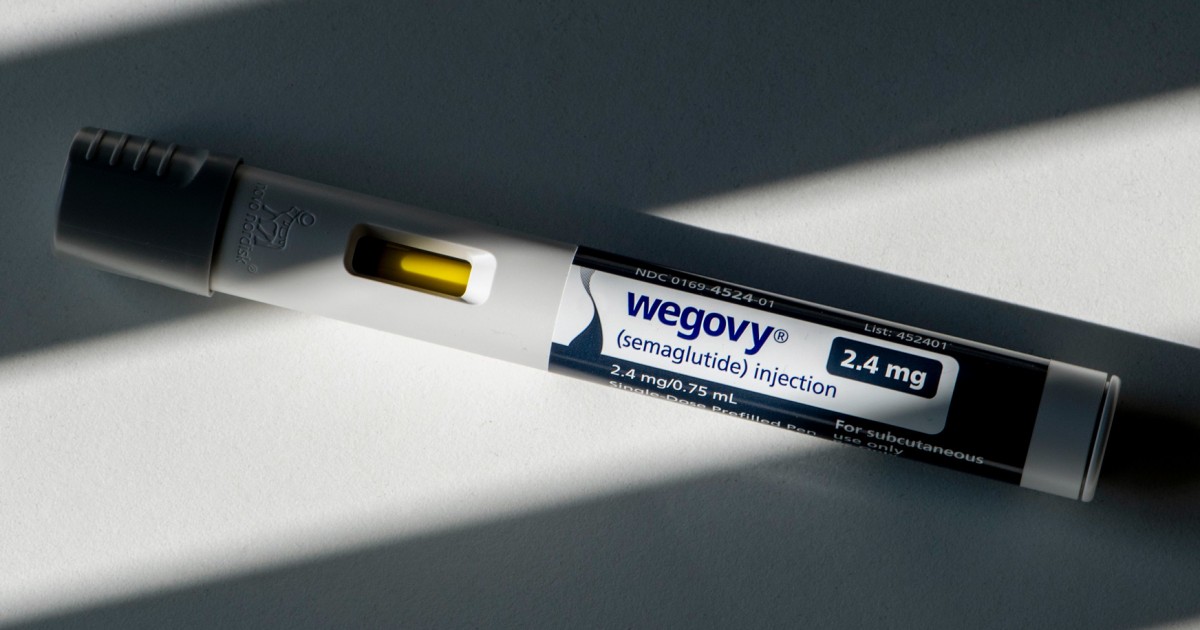Profile
Sections
tv
Featured
More From NBC
Follow NBC News
There are no new alerts at this time
The makers of Ozempic, Wegovy and Mounjaro are racing to prove that the incredibly popular drugs have health benefits beyond weight loss and diabetes. Doing so, they say, will make it easier for patients to get insurance to cover the pricey medications.
Clinical trials are underway to see whether the drugs can reduce the risk of heart attack, stroke, kidney disease and other chronic diseases in people with obesity.
Even though obesity is associated with a number of health risks, insurance companies often don’t cover the cost of weight loss medications, which can exceed $1,000 for a month’s supply.
“The reason why it’s not covered is because there is a perception that obesity is considered a cosmetic issue as opposed to a chronic disease,” said Dr. Peminda Cabandugama, an endocrinologist at the Cleveland Clinic. “But these medications not only help with weight loss, but give cardiac benefits, help with blood pressure, help cholesterol and kill sleep apnea.”
Another barrier is a 2003 law that prohibits Medicare from covering weight loss drugs, cutting off a huge group of potential patients. Private insurance companies also often take cues about what to cover from the federal program.
“We recognize that these medications are priced very highly by pharmaceutical companies,” said Dr. Beverly Tchang, an endocrinologist at Weill Cornell Medicine in New York. “Coverage and accessibility is definitely going to be the biggest challenge as we move forward in treating people with obesity.”
In August, Novo Nordisk, the maker of Ozempic and Wegovy, became the first to demonstrate in a large clinical trial that the drugs provide health benefits beyond weight loss and diabetes management. In a phase 3 trial of more than 17,000 adults with obesity, Wegovy was shown to cut the risk of cardiovascular events, such as heart attack and stroke, by 20%. (Ozempic, approved for Type 2 diabetes, and Wegovy, approved for weight loss, both contain the same drug, called semaglutide.)
Tchang said that while earlier clinical trials for drugs like semaglutide for diabetes and weight loss found that the drugs also improved blood pressure and cholesterol — two risk factors for heart disease — the Food and Drug Administration needs standalone studies looking at heart health in order for a company to be able to say the drug has that benefit.
Last week, Novo Nordisk announced results from another clinical trial that found that Ozempic slowed the progression of kidney disease in patients with Type 2 diabetes.
Eli Lilly, the maker of diabetes drug Mounjaro, is expected to get the drug approved for weight loss late this year or early next year. On Sunday, at the 2023 ObesityWeek conference in Dallas, Lilly presented the full results from its SURMOUNT-3 trial, which found that after 72 weeks, people who took tirzepatide, the drug found in Mounjaro, lost about 60 pounds, while those who got a placebo regained weight. Both groups had been asked to make intensive lifestyle changes, including following low-calorie diet, exercising and attending weekly counseling sessions for 12 weeks before starting the medication.
Lilly also hopes to secure approval for a different weight loss drug, called retatrutide, within the next few years.
At the same time, the drugmaker is also conducting several clinical trials to see whether its drugs can treat obstructive sleep apnea, nonalcoholic fatty liver disease and other chronic diseases.
“There are lots of benefits to be gained,” Dr. Nadia Ahmad, Eli Lilly’s medical director of obesity clinical development, said of the drugs. After losing weight, “there’s more cardiometabolic benefits, the blood pressure goes down further, the insulin goes down further, lipids improve further.”
Ahmad said the clinical trials will provide important insights for physicians treating patients, as well as for insurance companies and governments when determining whether to include weight loss drugs in their coverage.
“All this data helps to inform decisions, whether the decision’s made by providers or government,” she said.
Mike Bergmann, 38, of Fort Myers, Florida, was initially lucky to get his insurance to cover his Wegovy prescription.
Bergmann said that despite running about 4 miles a day for about a year, he struggled to lose weight until he started taking Wegovy in December.
“I was like, ‘I’m going to try this,’” he said. “I work as a mortgage loan officer, so I’m pretty much in the office early in the morning until late.”
In a few short months, he said he lost around 50 pounds, as well as the desire to drink alcohol.
He said that he could have lost more weight if his insurance hadn’t unexpectedly stopped covering his prescription over the summer. The insurer claimed that the drug was not medically necessary, and suggested diet and exercise instead.
Without coverage, he couldn’t cover the out-of-pocket cost of the drug — about $1,300 a month.
But Bergmann said he would’ve stayed on it if he could.
There are some indications insurers and lawmakers may be coming around to the idea of covering weight loss drugs.
In 2021, House lawmakers introduced The Treat and Reduce Obesity Act, which would have allowed the federal government to expand Medicare Part D coverage to include weight loss medications. The bipartisan legislation had 154 co-sponsors, according to Congress.gov, but did not receive a vote on the House floor before the term ended.
What’s more, the Congressional Budget Office said this month it is calling for new research to support the use of weight loss drugs under Medicare as well as the potential savings they could provide.
Employers may also be warming up to covering weight loss drugs. (Because most Americans get their health insurance through work, employers play an important role in deciding what a company’s plan will cover.)
Research being presented on Monday at the ObesityWeek conference found that human resources executives and benefits consultants have overwhelmingly positive opinions about weight loss drugs, agreeing that the medications can help employees feel more in control of their weight and enhance their overall quality of life.
The findings — based on a survey conducted from May to December 2022 — also indicate, however, that these executives and consultants want more data on the drugs’ additional health benefits to warrant the high cost before offering coverage to their employees.
“HR benefits specialists really see a potential role as far as improving and treating obesity and its other related conditions and improving quality of life for employees,” said Dr. Kimberly Gudzune, an associate professor of medicine at The Johns Hopkins University School of Medicine who is presenting the findings. “But now we’re really looking at and are hoping for more information on that financial side.”
In the meantime, Gudzune said employees, even at smaller companies, could potentially benefit from speaking with the HR representatives about why they don’t cover weight loss medication.
“I think there is a role for employees sort of advocating,” she said.
CORRECTION (Oct. 16, 2023, 4:20 p.m. ET): A previous version of this article misspelled the last name of an endocrinologist at the Cleveland Clinic. He is Dr. Peminda Cabandugama, not Cabandumanga.
Follow NBC HEALTH on Twitter & Facebook.
Berkeley Lovelace Jr. is a health and medical reporter for NBC News. He covers the Food and Drug Administration, with a special focus on Covid vaccines, prescription drug pricing and health care. He previously covered the biotech and pharmaceutical industry with CNBC.
© 2024 NBC UNIVERSAL


